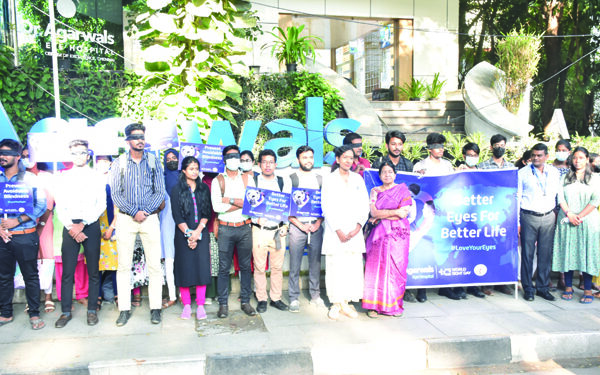R ARIVANANTHAM
CHENNAI, OCT 13
One has to follow 20-20-20 rule to safeguard from eyesight issues caused by the usage of gadgets, said Dr Manjula Jayakumar, Senior Opthalmologist of Dr Agarwal’s Eye Hospital here on Thursday.
Addressing reporters on the sidelines of blind-folded human chain programme to create awareness on eyesight issues on the World Sight Day 2022 in front of the hospital, Dr Manjula Jayakumar said, “Over half of the blindness can be prevented if the eyes are taken care of especially in children. The usage of digital screen-based devices be it mobiles, television or laptops have led to a high number of eyesight complaints especially in children. If one follows the 20-20-20 rule, the chances of eyesight issues can be reduced to a very large extent. Under this rule, a user of any device should take a break every 20 minutes; look at an object 20 feet away for 20 seconds. Following this rule helps eyes to be less strained. One should also blink 12 to 14 times a minute to avoid dry eyes.”
- To mark the World Sight Day 2022, the hospital organises blind-folded human chain
- Under this rule, a user of any device should take a break every 20 minutes; look at an object 20 feet away for 20 seconds
- The prevalence of myopia exceeds 28% globally, and there are projections that approximately 50 percent of the world’s population will have some degree of myopia by 2050.
“Diabetic patients above 50 years need to get their eyes screened at least once a year by an ophthalmologist, as over 30 percent of these patients end up developing some form of diabetic eye diseases such as diabetic retinopathy, diabetic macular edema, cataract and glaucoma.” Dr Manjula Jayakumar added.
Over 100 people from all walks life – students, general public, doctors and staffs of Dr Agarwal’s Eye Hospital took part in the human chain campaign blind folded to create awareness on the importance of vision impairment and encourages the citizens to take care of their eyes.
Unoperated cataract and uncorrected refractive error are the leading causes of vision impairment. Other causes such as dry eyes, age-related macular degeneration, glaucoma, diabetic retinopathy, infectious diseases of the eye, and trauma, however, cannot be ignored and need to be addressed. Nearsightedness, or myopia, is becoming more prevalent worldwide. The prevalence of myopia exceeds 28% globally, and there are projections that approximately 50 percent of the world’s population will have some degree of myopia by 2050.
World Sight Day is annually observed on every second Thursday of October, it aims to draw attention on issue of blindness and visual impairment. This year is celebrated on 13th October and the theme of this year #LoveYourEyes too.










